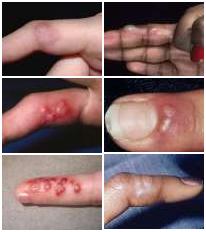Herpes Simplex Virus
Herpes simplex virus type 1 (HSV-1) is a common cause of cold sores around the mouth. Herpetic whitlow is an infection on the fingers involving exquisitely painful blisters that are caused by transfer of the virus from other areas of infection, most commonly cold sores or fever blisters, to the hands and fingers. Fire fighters may repeatedly encounter HSV infections as these are among the most common maladies affecting humans.
How can you get it?
The herpes virus is quite contagious and is transmitted in three ways:
- Direct contact of open skin (a wound) with a herpes lesion
- Contact with saliva that is contaminated with the herpes virus
- Self-infection (for instance; nail biting in someone who has oral sores or fever blisters)
Symptoms
Following an incubation period of 2-20 days, the signs and symptoms of herpetic whitlow include:
- Pain, burning, tingling in infected finger
- Redness
- Swelling
- Blisters or Vesicles filled with clear fluid
- The vesicles resolve by first crusting and then healing in 7 – 10 days
- Lymph nodes in the armpit may swell and become painful


The herpes simplex virus infection on the finger is known as herpetic whitlow (see above image). Grouped, fluid-filled or pus-filled, blisters are typical and usually itch and/or are painful.
Oral herpes infections are largely responsible for occupational exposure and appear as:
- Blisters or ulcers in the mouth, gums, lips, throat and face
- Blisters are filled with clear fluid
- Skin around the blister is raised, red and painful
- However, some individuals do not have symptoms but can still transmit the virus.
Complications that may occur with any herpes virus include:
- Recurrence of the disease throughout a person’s life.
- Recurrent episodes are typically triggered by stress, excess sun exposure, surgery, hormonal changes, and other illnesses.
- Bacteria can infect the skin before the blisters heal if the skin is contaminated.
- Never try to cut out any of these blisters as this may spread the infection or lead to a bacterial infection in addition to the viral one.
- The virus can also spread to other areas of the skin and body.
- A troubling fact is that “Herpes infection of the eye is a leading cause of blindness in the United States, causing scarring of the cornea.”
Prevention
- Avoid direct contact with herpes sores
- Using Universal Precautions
- Use gloves for patient encounters, especially when managing oral secretions
- Hand hygiene (wash with soap and water or using an alcohol based hand rub)
No treatment currently exists that will cure herpes infection. Antiviral medications such as acyclovir, famciclovir, and valacyclovir may help the symptoms go away sooner and decrease some of the pain.
What should you do if you are exposed to the disease or get the disease?
Any blisters near the eyes require professional medical attention and evaluation. Herpetic whitlow will resolve without treatment but medications for symptomatic relief are available. Acyclovir may be beneficial.